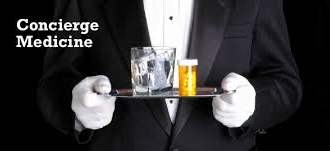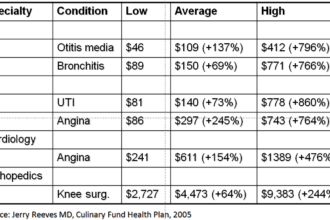American emergency departments take a lot of heat from critics who assert that they are one of the places in our health care system where resources are wasted in abundance. These arguments have less to do with the emergency departments themselves, and more to do with people using emergency departments for non-emergent conditions. One estimate puts the excess spending at $38 billion a year.
American emergency departments take a lot of heat from critics who assert that they are one of the places in our health care system where resources are wasted in abundance. These arguments have less to do with the emergency departments themselves, and more to do with people using emergency departments for non-emergent conditions. One estimate puts the excess spending at $38 billion a year. By contrast, the American College of Emergency Physicians (ACEP) claims that care received in emergency departments accounts for only 2% of national health expenditures. However, new research from Michael Lee and colleagues appearing in the Annals of Emergency Medicine, finds that, because of data limitations, previous estimates of emergency department spending are misleading.
The 2% figure appears to be based on a faulty interpretation of the Medical Expenditure Panel Survey (MEPS) conducted by the Agency for Healthcare Research and Quality. The MEPS figures that ACEP uses for their calculations did not include more expensive admitted patients (only those that were seen in the ER and released), did not include institutionalized patients such as elderly nursing home patients, and significantly undercounts the total number of ER visits nationally compared to a number of other established surveys.
In their study, Lee and colleagues use a variety of data sources and construct estimates using several different assumptions to generate a more reliable range of emergency department spending in the U.S. Their conclusion is that emergency department care likely represents 5 or 6% of national health expenditures, although the true figure could be as high as 10%. That’s a figure 3 to 5 times as great as what the American College of Emergency Physicians is reporting, so it’s safe to say that, to the extent one trusts these new numbers (and I do), the argument that emergency care isn’t a big contributor to national health expenditures pretty much falls apart.
What is left, then, is the question of whether that level of spending is inherently wasteful. On this point, the authors review the economic literature on the costs of providing emergency care. The accepted paradigm had been that the ER was a high fixed cost, low marginal cost enterprise. But the authors show that empirical studies testing that hypothesis using regression analysis have been variable and poorly designed. They favor an accounting-based approach rather an econometric one, using principles from time-driven activity based accounting popularized by Kaplan and Porter. That approach puts greater emphasis on the scalability of resources such as labor, space and equipment that might otherwise be viewed as fixed.
I asked Lee about the implications for policymakers from their line of work:
On the topic of diverting low acuity care: “Diverting low acuity visits may save payers some money but I’m skeptical that there would be large aggregate savings….Studies that look at ex-ante measures of severity or urgency (as opposed to diagnosis-related measures which are ex-post) generally show that the volume of non-urgent care is lower than the public perceives. And a further point is that the actual reimbursements for non-urgent care is likely to be on the low side to begin with since it’s a population more likely to be uninsured or underinsured. Finally, you have to also take into account the fact that primary care offices and clinics may not have the capacity to see high volumes of unscheduled care, so diverting care will simply shift the cost burden. I think there is far more promise in understanding and questioning expensive decisions ER physicians make such as admitting patients to the hospital or the volume of diagnostic testing ordered.”
Lee and his co-authors want to move beyond the issue of minimizing costs, however, and in their paper they call for a greater emphasis on value, writing:
“With 130 million visits, 28% of all acute-care visits, and accounting for nearly half of all admissions, emergency medicine should be expected to represent a large share of health care spending….More attention should be devoted to quantifying the value of specific aspects of emergency care. Rather than minimize the issue of cost, we should recognize the economic and strategic importance of the ED within the healthcare system and demonstrate that costs are commensurate with value.”
Lee acknowledges that this remains a challenge for the field of emergency medicine. “The core of our business is ruling out critical diagnoses. Many of the things we look for are low probability but highly dangerous conditions. The big question is how do you quantify value when your work is often focused on trying to demonstrate the absence of something?”








